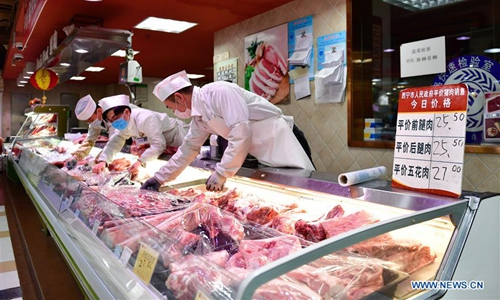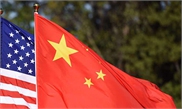
Staff members of a supermarket arrange meat for sale in a supermarket in Xining, northwest China's Qinghai Province, Jan. 31, 2020. Supply of daily necessities remained steady in major Chinese cities while authorities have been stepping up efforts to ensure continuous supply and stable prices amid the novel coronavirus outbreak. (Xinhua/Zhang Long)
The force majeure clause of the phase one trade deal between China and the US might be triggered if more meat companies in the US are affected by COVID-19, Chinese experts said, after China suspended imports from Tyson Foods, one of the largest meat producers in the US on Sunday, over cluster cases of COVID-19.
The suspension is not likely to "fundamentally" harm the phase one deal, under which China promised to purchase $36.5 billion worth of American agriculture products, experts said, but they warned that renegotiations will be needed if there's a large-scale COVID-19 outbreak in the US food sector.
Although many of the hotspots with COVID-19 infections in the US are linked to meat plants, so far, China's General Administration of Customs (GAC) has not banned imports from other US meat companies, the GAC said on Sunday, noting that shipments from Tyson that have arrived at ports or are still in transit will be detained.
Tyson Foods, which produces around 20 percent of the beef, pork and chicken in the US, confirmed on Friday that of the 3,748 employees are tested for COVID-19, 481 - or 13 percent - were positive.
The company said those cases "would not have been identified" without its large scale testing.
"According to the phase one deal, renegotiations are called for in the case of natural disasters or unexpected and uncontrollable incidents that make it impossible to fulfill the obligations," Hu Qimu, a senior fellow at Sinosteel Economic Research Institute, told the Global Times on Sunday.
"If there's a huge outbreak of the coronavirus among US agricultural companies, there might be a need to renegotiate the deal," Hu said.
However, Hu noted that the suspension is only for the purpose of COVID-19 control and prevention.
"At present, epidemic prevention and control outranks free trade in all countries in terms of priority.
"It is natural to suspend the import of products from enterprises affected by COVID-19 after the resurgence of COVID-19 in Beijing's Xinfadi food market, which was possibly linked to the cold chain transportation of agricultural products," Hu told the Global Times on Sunday.
Tyson Foods was previously subject to a ban from China on all US poultry and egg products since 2015 over an outbreak of avian flu there. The ban was lifted in December 2019, and US poultry companies had high hopes for the Chinese market, especially after the outbreak of African swine fever in China, which forced many consumers to seek alternatives to pork.
In 2013, China bought $500 million worth of US poultry products, according to the US Department of Agriculture.
Sanderson Farms, another big poultry company in the US, was anticipating the current 35 percent tariff on American chickens would be lifted earlier this year after the signing of the phase one deal.
US Trade Representative Robert Lighthizer predicted more than $1 billion in annual poultry shipments to China after the nearly five-year ban on US imports was lifted last year, according to a report by Reuters.
"Cases in a single company will not affect the phase one trade agreement between China and the US, unless a greater part of the meat supply chain of the US is infected," Zhou Xuezhi, a research fellow at the Chinese Academy of Social Sciences, told the Global Times on Sunday.



